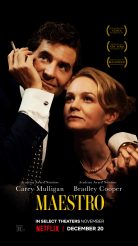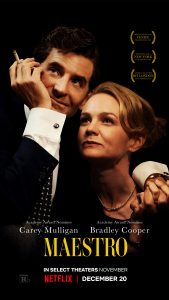Rating: R
Stars: Carey Mulligan, Bradley Cooper, Matt Bomer, Maya Hawke, Sarah Silverman, Josh Hamilton, Scott Ellis, Gideon Glick, Sam Nivola, Alexa Swinton, Miriam Shor
Writers: Bradley Cooper & Josh Singer
Director: Bradley Cooper
Distributor: Netflix
Release Date: November 22, 2023 (theatrical); December 20, 2023 (Netflix)
“A work of art does not answer questions, it provokes them; and its essential meaning is in the tension between the contradictory answers.” – Leonard Bernstein
MAESTRO, which is about the famed conductor/composer/musician and his wife, the actor Felicia Montealegre Cohn Bernstein, opens with this quote. It’s certainly fair enough to quote Bernstein, it’s a valid opinion, and it largely describes the film that follows.
But the stated intention not to answer questions also gives Bradley Cooper, who directed, co-wrote the script with John Singer, and stars as “Lenny,” something of an out as far as what we see and what is expressed.
In MAESTRO, we start with the framing device of Lenny in his home, playing the piano for an interview crew. He misses his late wife Felicia (Carey Mulligan), and imagines that she appears to him on occasion.
Then the aspect ratio changes and we’re in black-and-white. It’s 1943 and World War II is raging, but more immediately important to Lenny is the phone call he receives while in bed with boyfriend David Oppenheim (Matt Bomer). The scheduled conductor of the New York Philharmonic has become ill and Lenny is tapped to lead the orchestra. He is an overnight sensation.
In 1946, Lenny and Felicia meet. They are delighted by one another and spend the night talking. They marry in 1951. At about the forty-seven-minute mark, MAESTRO erupts into widescreen and color.
Felicia insists to her friends, including Lenny’s sister Shirley (Sarah Silverman), that she knows what she’s gotten into. This includes the stated fact of Lenny’s extraordinary fame and popularity, and the less openly-acknowledged matter of Lenny’s trysts and affairs with other men, some of whom he brings home to the family as friends.
Cooper plays Lenny with charisma and a lot of delight. Mulligan conveys the feel of the era perfectly; in the early scenes, we could be watching a film made in the ‘40s or ‘50s. The technical aspects are beautiful.
It will take a reviewer whose familiarity with classical music is better than my own to evaluate how well Cooper does in the conducting scenes, but he is committed and his musicians are persuasively responsive.
There’s a scene early on where Lenny and Felicia listen to advice from an older member of New York’s musical establishment, who says that a Jewish conductor will never receive worldwide acceptance. If Lenny changes his name to “Burns,” he’ll be much more successful. Lenny is polite, but rejects the suggestion.
But MAESTRO is reticent about directly contrasting Lenny’s refusal to cloak his heritage with his smooth adoption of outward heterosexual convention.
So, the questions provoked but not answered in MAESTRO include, first and foremost, whether and how Bernstein’s personal life affected his art. Other obvious lines of inquiry are, although there is obviously great emotional love there, whether he would have married at all had the times not demanded it, and why he would bring lovers home, only to apologize to Felicia when it’s clear she’s hurt by this. This isn’t a matter of gay/hetero sensibilities, this is a matter of common sense.
There’s reunion scene between Lenny and David, both now married, where they say practically nothing, but there are tears in their eyes. This might have more heft if we had more of what their relationship had been like when it was more active.
On Felicia’s side, we aren’t sure how much of her growing sadness is because of Lenny’s affairs, which she can’t bring herself to put into words, and how much is because of the way he and his legend take up space – which she finally does speak up about.
We do comprehend that Felicia is being honest about entering the marriage with a fairly accurate notion of what it will be like. Yet another question is how much of this is for love of Lenny, and how much of this may be resistance to a more conventional marriage. Is there something for Felicia in knowing that she will never have to compete with other women for her husband’s affections?
Obviously, there’s no way anyone except the real people could know any of this for certain. Since it seems like it would be disrespectful to make definitive statements, MAESTRO doesn’t, but this leaves us feeling at the end like we perhaps could have read about all parties concerned and come to our own conclusions. We feel like we’re in good company, everything looks great, the music is excellent, but a fictional drama could have asserted a clear point of view that is lacking here. It’s interesting, but not deeply satisfying.
Related: Movie Review: RACE FOR GLORY: AUDI VS. LANCIA
Related: Movie Review: A DISTURBANCE IN THE FORCE
Related: Movie Review: FREUD’S LAST SESSION
Related: Movie Review: LORD OF MISRULE
Related: Movie Review: THE SACRIFICE GAME
Related: Movie Review: ORIGIN
Related: Movie Review: A NIGHTMARE ON 34th STREET
Related: Movie Review: IT LIVES INSIDE
Related: Movie Review: A CREATURE WAS STIRRING
Related: Movie Review: MAY DECEMBER
Related: Movie Review: EILEEN
Related: Movie Review: WISH
Related: Movie Review: NAPOLEON
Related: Movie Review: TROLLS BAND TOGETHER
Related: Movie Review: SALTBURN
Related: Movie Review: THE MARVELS
Related: Movie Review: IT’S A WONDERFUL KNIFE
Related: Movie Review: HELL HOUSE LLC ORIGINS: THE CARMICHAEL MANOR
Related: Movie Review: PROJECT Z (PROSJECT Z)
Related: Movie Review: FIVE NIGHTS AT FREDDY’S
Related: Movie Review: SUITABLE FLESH
Follow us on Twitter at ASSIGNMENT X
Like us on Facebook at ASSIGNMENT X
Article Source: Assignment X
Article: Movie Review: MAESTRO
Related Posts:












